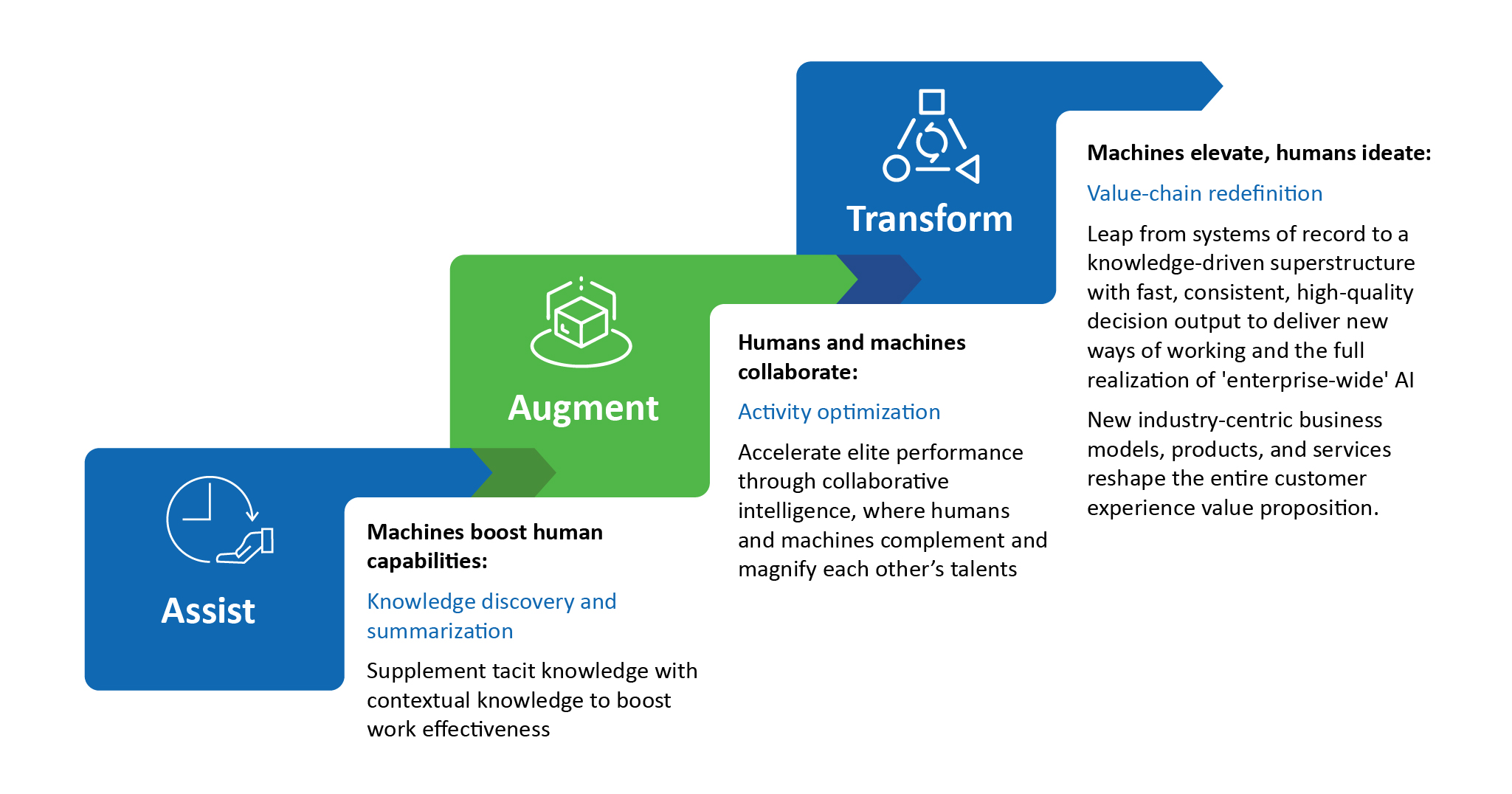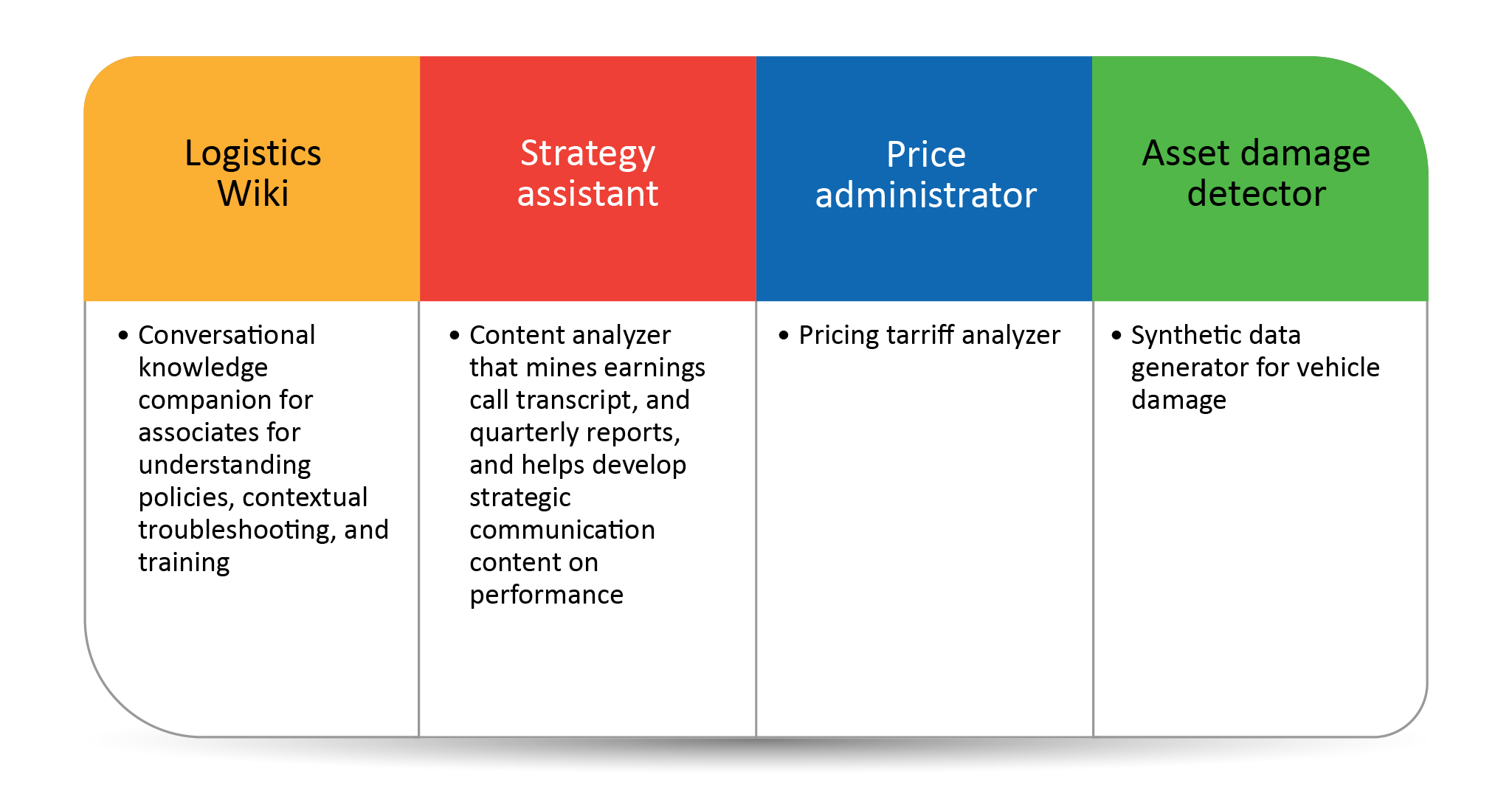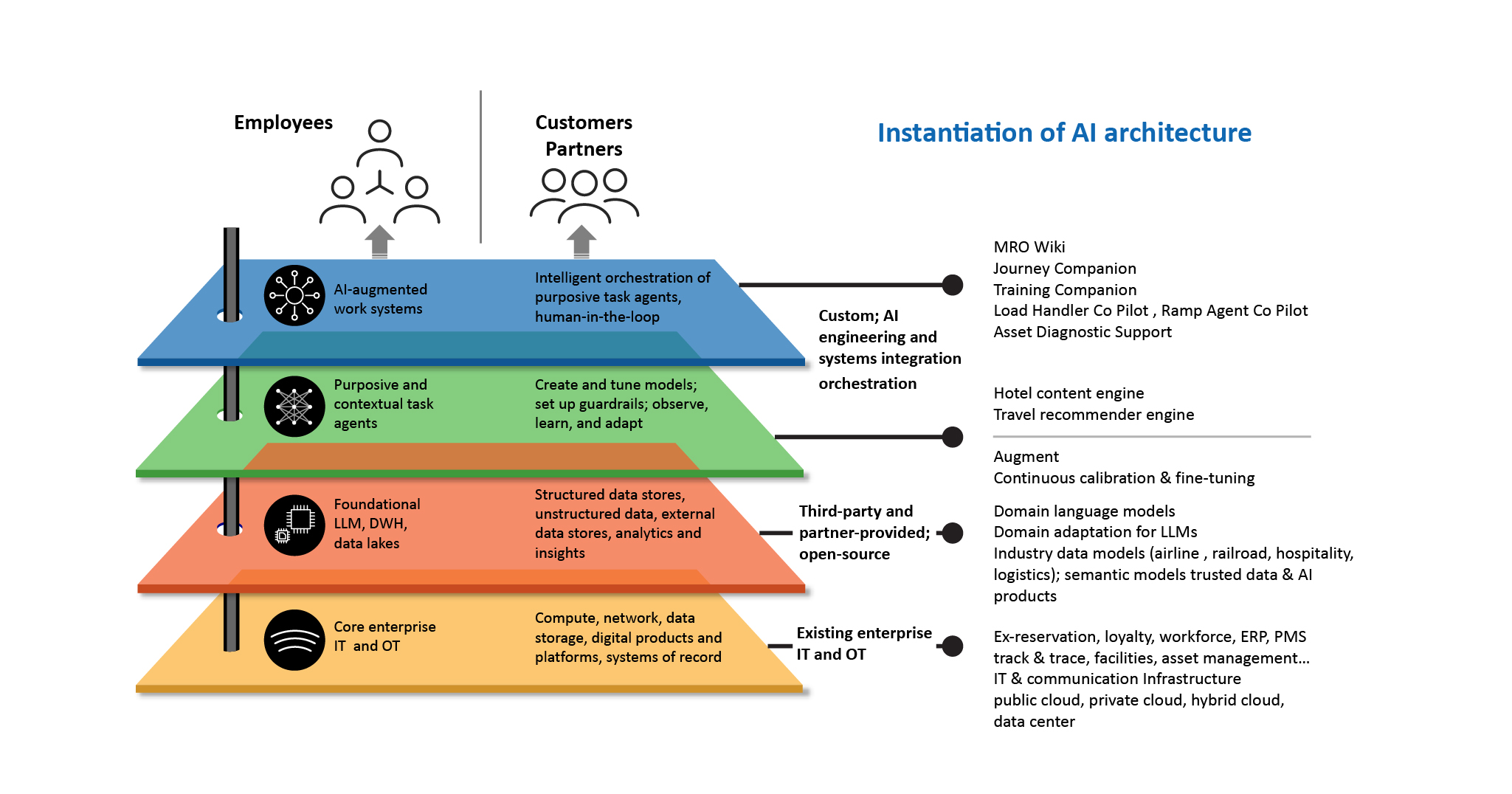Industries
HIGHLIGHTS
- Travel and logistics companies can unlock significant value with the help of GenAI tools.
- GenAI can transform the conventional processes to help organizations improve performance, foster innovation, and boost efficiency.
- Besides improving productivity and efficiency, GenAI has the potential to not only unlock but also democratize knowledge, thus opening up new revenue streams for organizations.
On this page
Harnessing the power of generative AI for travel and logistics companies
Generative artificial intelligence (GenAI) holds transformative potential for the travel and logistics industry.
While many discussions focus on the productivity improvements that GenAI engenders, an even greater value lies in its ability to unlock and democratize knowledge, leading to additional revenue streams.
GenAI-driven machine intelligence enables new ways of working and enhances decision-making by tapping into the contextual knowledge of an enterprise.
GenAI revolutionizes traditional processes at every stage of the customer’s journey. By harnessing the power of advanced algorithms, it optimizes route planning, streamlines scheduling, and predicts demand patterns with unprecedented accuracy. It also provides real-time visibility into shipments, improves load factors for carriers, and predicts asset maintenance needs better. AI enables highly personalized travel experiences, from tailored recommendations to dynamic itinerary planning. AI-powered chatbots provide 24/7 customer support, while predictive analytics optimize operations and improve efficiency. Additionally, AI enhances marketing and branding efforts through hyper-personalized campaigns and immersive virtual experiences.
GenAI case studies
GenAI, ultimately, makes the travel experience more seamless and efficient for both travelers and industry professionals.
This will reshape the travel and logistics landscape into a more dynamic, responsive, and user-centric ecosystem. Through case studies, we look at some areas where AI, including GenAI, can have a profound impact.
A leading postal service provider in the Nordics used AI and mathematical optimization to rationalize the transportation of parcels and letters in over 400 regional distribution centers. The AI system analyzed historical data on package volumes, delivery routes, and transportation costs to identify areas for improvement. By generating accurate forecasts, optimized routes and schedules, the AI system reduced transportation costs by 10%, in turn lowering emissions and improving delivery times. The AI system also simulated various scenarios to help the company adapt to changing demand patterns and seasonal fluctuations, and plan operations better.
A leading logistics company leveraged GenAI to support engineers in assets maintenance and training. The GenAI system utilized retrieval-augmented generation (RAG) to provide accurate and relevant answers to engineers' questions. By indexing a vast repository of asset maintenance manuals, it enabled engineers to quickly access critical information, streamlined their workflow and reduced the time spent searching for relevant documentation. The system also helped new engineers get up to speed faster, accelerating their training and onboarding process. With the GenAI system's support, engineers were able to perform maintenance tasks more efficiently, resulting in reduced downtime and improved overall equipment effectiveness.
Pillars of GenAI adoption
GenAI adoption will require an adaptive strategy that makes AI consumable for an enterprise-grade transformation
This strategy will involve varying levels of collaboration between humans and machines.
GenAI for travel and logistics companies can be broadly categorized into the following types (see Figure 1)
where AI boosts human capability
where AI and humans work in a collaborative network
where AI + humans work together, producing new capabilities and new business models that create new value streams for the enterprise
Let’s look at how this approach can be implemented in key sub-sectors in travel and logistics.
Aviation
AI enhances flight operations by optimizing scheduling, fuel management, and crew allocation, leading to cost savings and increasing on-time performance. AI-driven predictive maintenance improves aircraft safety and reduces downtime by preempt potential issues that can disrupt operations (see Figure 2).
In aviation, GenAI can bring about significant improvements in:
GenAI will provide contextual information about customers, including travel history, preferences, location, and demographics, to assist customer service agents make better recommendations and offers and improve customer service.
Analyze information contained in service agreements with ground handlers for better management of ground operations, and to support flight operations.
Mine knowledge from tech and cabin logs to assist in fault diagnosis, troubleshooting, and generate reports for maintenance planning, quality control, and compliance needs.
Create crew, cargo, MRO (maintenance, repair, and operations) and other workforce training.
Other applicable emerging areas include revenue management recommendations, and senior management alerts or reports (eg competitors’ performances, service fallouts).
Hospitality
GenAI offers an opportunity for hotels, cruise lines, and rental car agencies to increase service speed while potentially reallocating human efforts to provide high-touch service in other meaningful areas.
The key areas for GenAI application within the hospitality ecosystem are experience-focused:
Assist contact center staff agents summarize calls, capture notes, reduce wrap time from the completed call so the agent swiftly transitions to the next call. It includes providing comprehensive measurements and monitoring call quality, email and chat transcripts for identifying strengths and areas of improvement.
Generate automatic content, for eg room descriptions, that are context and taxonomy aware, that renders appropriate content for booking sites, apps, blogs, brochures, and collaterals, differentiating each to produce tailored, consistent, and brand-representative content.
Include smart, concise, rich content (photos and videos) and generate automated draft request for proposal (RFP) responses.
Sample use cases
Digital concierge: Interactive chatbot with avatars understands customer needs and provides them with personalized solutions and itineraries by suggesting activities and hotel facilities, handling guest queries via voice and text modes.
The Contact Center Efficiencies tool aids agents by summarizing recent calls, generating outcomes convertible to notes for the guest portfolio. Gen AI can also analyze call patterns to provide improvements and help in performance enhancements.
The RFP Response Generator offers a user-friendly interface that seamlessly integrates with a hotel's existing customer relationship management (CRM) system to write automated responses to RFPs. The interface utilizes GenAI to learn from previous RFPs and client feedback.
The GenAI hotel/group chatbot is a virtual chatbot uniquely crafted to participate in a group chat with members of a contracted or informal group. Its purpose is to enhance guest experience by facilitating communication among group members, enabling them to engage with hotel staff for inquiries and recommendations.
Package logistics and freight railroad
GenAI optimizes package logistics by automating sorting, routing, and tracking processes, which improves delivery accuracy and speed, and reduces operational costs. AI solutions enhance freight railroad operations through predictive maintenance, route optimization and demand forecasting, reducing downtime and improving efficiency across rail networks.
The key areas in logistics and railroad that will benefit from GenAI are (see Figure 3):
Conversational support systems such as chatbots deliver precise and contextual information for customer inquiries and staff queries. Document mining, one of the key strengths of GenAI, will amplify staff productivity by making the most needed information available at their fingertips. Training and technical knowledge exploration is another key area to improve speed and quality of onboarding of new associates.
GenAI output can assist in quick, effective messaging of key performance across different units of the organization. Areas such as competitor analysis benefit from GenAI-based earning call analyzers, bots that gather and analyze information along various dimensions from quarterly reports.
GenAI’s ability to survey various data for supplier information such as capabilities, capacity, and existing contracts can help review prevailing contracts and buying policy guidelines. By analyzing existing price tariffs, commercial teams can determine pricing settings that can be applied for various products.
Vehicle damage detection can significantly benefit from GenAI’s ability to generate test data for various scenarios, including for very rare occurrences. Machine vision models trained on this test data are likely to deliver greater accuracies, thereby improving safety.
Sample use cases
Gen AI Customer Portal Assistance Bot is a chatbot assistant that can provide real-time information on services and pricing details by integrating and querying on websites or documents containing multitude of information, such as packaging guidelines, types of shipment, step-by-step instructions on safe shipping and more. It can also be integrated to give personalized responses and tracking to existing customers.
Smart Email Response Generator is an automated email response system to efficiently process and respond to customer emails, pricing queries, pickup appointment scheduling, in-transit visibility and much more. It uses GenAI-powered intent extraction and composable workflow-based empathetic email response system. It helps with manual task reduction and automating personalized email responses to customers.
HR helpdesk is an AI-based platform for internal associates, both salaried and contract hires, to address employee queries across various areas, including policy-related and eligibility-related queries in payroll, leave management, onboarding, training and development, performance management, and more. Using GenAI, routine and repetitive responses are automated and customized, and delivered through various channels, including email, chatbots, or voice responses.
Credit control analysis enables logistics companies to regularly assess, review, and monitor the creditworthiness of customers across various industry segments and determine appropriate credit lines and payment terms by efficiently processing large volumes of data, both external data from the customer's industry and internal transactional, sales, and payment data.
A multi-layered solution architecture unlocks value at various levels
Travel and logistics companies should embrace a future-forward, value-first approach to make GenAI consumable at scale.
To achieve this, they will have to utilize the following core principles:
Contextualize AI to drive innovation for re-imagining industry value chains of the future.
Extract valuable, prescriptive insights from the abundance of data to help drive efficient decision-making for elevated business outcomes.
Envisage a web of synergistic networks and create solutions that unlock value across ecosystems.
Continue to harness the expanding power and versatility of various cloud architectures, including public, private, hybrid, and edge.
For the travel and logistics industry to transform the potential of GenAI into sustained performance, an enterprise architecture that is optimized for cost, quality, security, and privacy is required. This calls for a layered architecture with each layer having a clear separation of objectives and well-defined integration patterns to enterprise systems and other sources (see Figure 4).
The following are the key layers to enable this architecture for the travel and logistics industry:
The bottom-most layer predominantly enables computing, network, and storage as a foundation coupled with public and hybrid clouds, and the existing enterprise IT and existing systems of record such as reservation, loyalty, workforce, ERP, property management system, sales and catering, track and trace, facilities, and asset management.
The next layer up enables foundational models and large language models (LLMs) for a variety of use cases in data analytics, classification, Q&A, recommendation, summarization, text generation, all embedded in a frictionless DevSecOps ecosystem. Additionally, this layer also houses domain-focused small language models tailored for specific domains like human resources (HR), contract management, engineering, and maintenance.
The next layer up constitutes GenAI-enabled purposive and contextual task agents to enable various moving parts of AI, such as, fine-tuning of AI models on an ongoing basis, establishing the necessary guardrails for responsible and ethical implementation of AI, and a strong ML and LLM ops capability for continuous learning by the models.
The final layer comprises task agents that interact with each other in a seamless fashion with a human in the loop for validation, verification, and disambiguation.
Small language models have a big role in the future of AI
Small language models (SLMs) are poised to dominate the GenAI landscape for several reasons. They require fewer computational resources, making them more accessible for developers and organizations with limited resources. Second, small models have faster responses. They are easier to fine-tune for specific tasks, leading to better performance in specialized applications. They allow for faster iteration and experimentation in model development, allowing for rapid prototyping and innovation. Small models are environmentally friendly, more sustainable than larger models, and can also be deployed on edge devices and across IoT devices and embedded systems in the future. This widespread deployment enhances accessibility and usability across various applications and industries.
Travel and logistics companies have an unprecedented opportunity to realize the transformative value of becoming a knowledge-driven enterprise. We believe travel and logistics companies will continue to focus more and invest on ’AI-augmented work systems’ and ’purposive and contextual AI engines” to have next-generation experiences and create new value chains for diverse stakeholders, including workforce, partners, customers, and digital natives.
Key contributors
B Subramaniam
Head of Data & AI, Travel, Transportation & Hospitality
Americas, TCS
Sridharan Vilva Kumar Alwar
Chief Technology Officer, Travel, Transportation, & Hospitality, UK-EMEA, TCS
EXECUTIVE CHAMPIONS
Kartick Narasimhadevara
Chief Scientist - AI, Travel, Transportation, & Hospitality
Americas, TCS
Dr Gopi Kandaswamy
Senior Scientist, Travel, Transportation, & Hospitality
UK-EMEA, TCS
Shalini Manchanda Mehtani
Head of industry offerings,
AI.Cloud, TCS
Nidhi Srivastava
Vice President and head of offerings,
AI.Cloud, TCS










